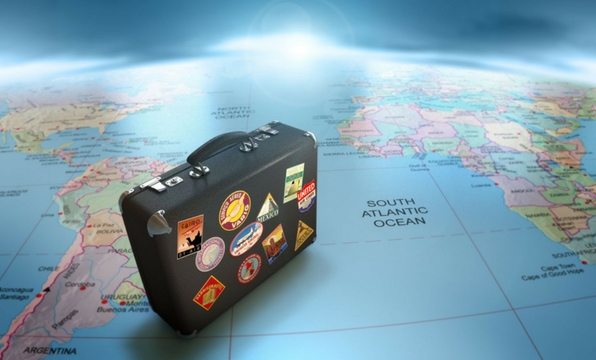How to Travel
You know you’re ready to hit the road and see the world, but you need a little help getting out the door. With some thought and careful planning, you can be headed for adventure sooner than you think. Start planning your escape!
Decide Where and When to Go
1.Determine how much money you can spend on a trip
- Remember that in addition to any travel expenses, you still have to pay rent and bills at home. Make sure you have enough to cover these essentials before you spend money traveling.
- Be savvy and cut out small, unnecessary purchases where you can. Eating in, avoiding ATM fees and skipping the $4 lattes are all quick, easy changes you can make to save extra cash for traveling.
- If you can’t afford to jet to a distant location but you’re itching to explore, research, where you can go that, is within a day’s drive of home. Search for national parks, weird roadside attractions, or even look at a travel guide for your area. If you don’t have wheels you can rent a car or take a bus to get away for a day.
2. Figure out how long you will be gone
If you are working, check how much vacation time you have saved up. Check your calendar for any important dates that might conflict with your travel plans–you might need to push your trip back a few days so you don’t miss your grandpa’s 100th birthday.
3.Choose when to go
Find out the high, low, and shoulder season for tourists at your destination by looking at their tourist bureau online. When you travel may also impact the cost of your ticket. If you’re not choosy about dates, you can plan your trip around the lowest fares.
- High season is when there are the biggest crowds, the best weather, attractions selling out, and the highest prices.
- Low season usually means great deals, fewer tourists, the possibility of terrible weather, and the risk of some attractions being closed. You may also find that locals are a little more welcoming.
- Shoulder season is considered the best time to travel. You get the best of both worlds–you will miss the crowds, snag the good deals, and still have good weather. Book right before or right after a high season to take advantage of shoulder season.
4. Decide what kind of trip you want this to be
Ask yourself what you’d like to get out of your time away. If you need a break from your hectic schedule, consider planning a relaxing beach vacation. If you are going crazy with boredom, look into an adventure vacation white-water rafting, zip lining, or rock climbing. Become one with nature by visiting a national park, or gain new perspective by visiting a country halfway across the globe.
- Many travel websites will include inspiration and ideas for different types of trips: family, ecotourism, road trips, and more. Try a website like Triptuner that will give you suggestions based on your preferences.
- Ask friends and family about places they’ve been. They may have some great recommendations and insights on what to do, where to stay, and what to eat.
Related Post: How To Create A Travel Budget
5. Set a budge
Do your best to estimate how much your entire trip will cost. Factor in travel expenses (plane or train tickets, gasoline if you’re driving), hotels or hostels, travel insurance, passport or visa fees, transportation at your destination (taxis, buses, car rental), the average cost of a meal (or set the total amount you are allowed to spend on food each day). Be sure you leave yourself some cash to splurge on something special and something extra for emergencies.
6.Make travel arrangements
There are dozens of websites you can use to search for reasonable flights all over the world. Take the time to check multiple booking search engines, as they don’t always feature the same deals. Try the airlines’ direct websites, too. If you’re not flying, you can book train and bus travel online, too.
7. Book your accommodations
From hostels to luxury hotels, tree houses, campgrounds, and private apartment rentals, there are tons of options when it comes to deciding where to stay. Consider how you plan to use your accommodations. If you want to meet other travelers and don’t mind sharing a bathroom, a hostel may be a good choice. If you want to sleep late and order room service in a fluffy robe, you probably want to find something upscale.
8.Make a rough itinerary
If you plan to visit multiple cities on your trip, try to determine how many days you will spend at each location. Decide which attractions are priorities and find out if you need tickets in advance. Don’t be too strict, though. If you’re stressing out because you’re 15 minutes behind your itinerary schedule, you (and your travel companions) aren’t going to have a very good time.
9. Find out if you need a visa
Some countries visitors to obtain a travel visa to enter the country. As with your passport, you should apply well in advance, as it could take days or weeks to process.
- You may need to arrange your hotel accommodations before applying for a visa and be asked to present the address and contact information when you apply.
10.Notify your bank or credit card company you will be traveling abroad
If your account shows sudden activity in another country, your card may be flagged for fraud. A quick phone call will keep your card from being declined or, in some cases, lost to an ATM machine that won’t give it back.
Source: wikihow


 TAFI Certified
TAFI Certified
